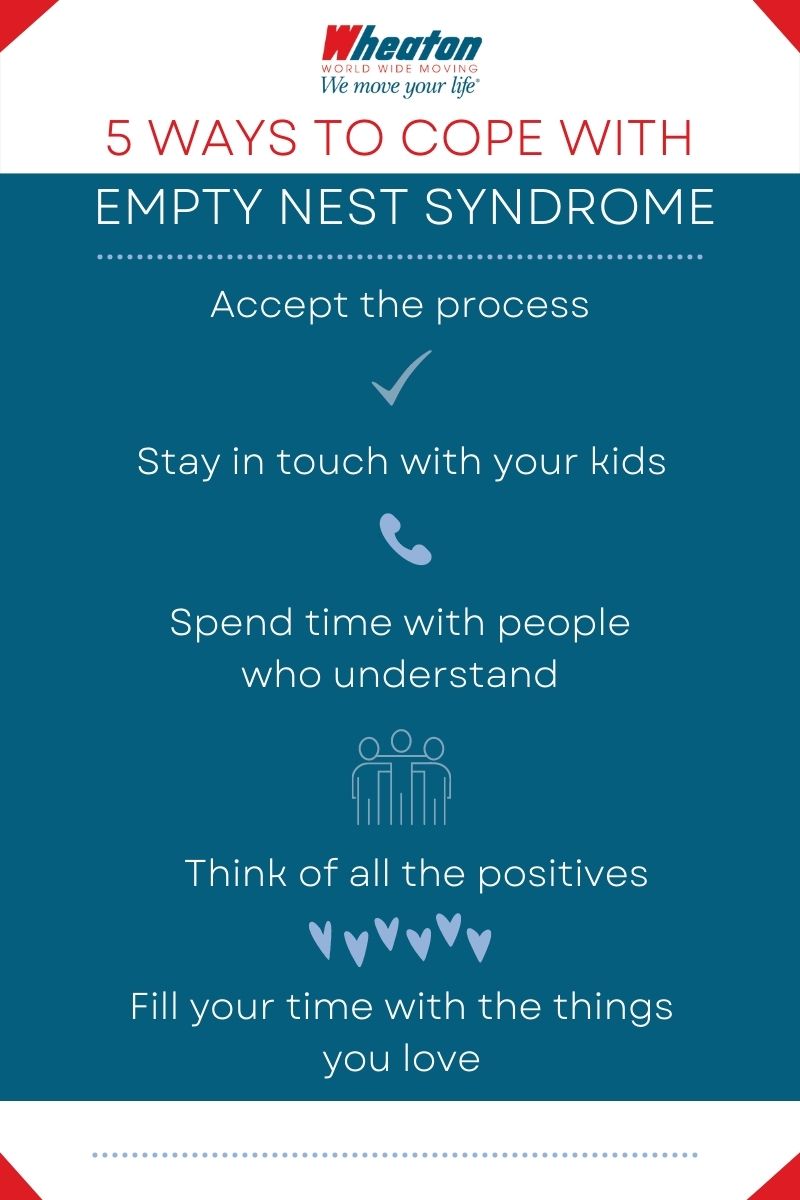When your kids are young, they fill your life with activities, tough conversations, laughter and infinitely more. From driving them to soccer practice to helping them through their first heartbreak, there’s never a dull moment as a parent. That’s why, when they grow up and leave the nest, it’s exciting yet scary.
Feelings of sadness, anxiety, fear and depression are common among parents when their children leave home. In fact, empty nest syndrome may be affecting more people than you think. Just because it’s common, you don’t have to put up with these difficult feelings. Learning about empty nest syndrome and ways to cope with it can put you on the path to making the most of your new life.
What is Empty Nest Syndrome?
Empty nest syndrome is when a parent or guardian feels sadness or distress after their children have left home. Empty nest syndrome can happen to any parent whose children have grown up and moved out for college, work or something else entirely. This tends to be more common in women than in men.

Empty Nest Syndrome Symptoms: What Does Empty Nest Syndrome Feel Like?
The feelings of empty nest syndrome are often confusing and complex for the person experiencing them. There’s a dissonance between wanting your child to be independent and confident, but also feeling heartbroken that you no longer live under the same roof. These feelings often lead to symptoms such as:
- Depression
- Feeling a loss of purpose
- Feelings of rejection
- Stress and anxiety
- Worrying about your child’s wellbeing
How to Adjust: Here are 5 Ways to Cope with Empty Nest Syndrome
If you’re struggling with empty nest syndrome, it’s important to practice self-care. Self-care can look different from person to person, but here are a few ideas of where to get started:
1. Start with Acceptance
Whether your child is moving out for work, school or studying abroad, it’s important that you don’t resist the process. Try your best to focus on all the ways you can help them thrive as they move out and make a new life for themselves.
There’s no use in comparing their timeline to yours or arguing that you think they’re making the wrong career move or school choice—it’s best to accept and support their decision so you can move forward with your life too.

2. Stay in Touch with Your Kids
Just because your kid is moving out doesn’t mean your relationship with them has to suffer. In fact, many parents experience that the relationship with their adult children improves once they move out! Ease your anxiety and sadness by staying in touch with your children. Talk on the phone, visit them in their new space, text and video chat. Remember, leaving home is hard on your kids, too, and they’ll likely appreciate the communication.
While it’s good to communicate, make sure you’re not checking in too much. In order for your child to successfully become their own person, and for you to adjust to being an empty nester, you’ll need to give them some space. A text or phone call here and there is great, but make sure you’re not overdoing it.
3. Spend Time with People Who Understand
Spend time and talk openly about your feelings with loved ones and friends who are in the same position. Feeling understood and validated can ease uncomfortable and unpleasant emotions. If you’re having a hard time finding somebody in your life who understands what you’re going through, try joining an empty nester group on social media or find a support group in your area.
Sometimes moral support isn’t enough. If you’re feeling depressed and are unsure how to help yourself, be sure to get in touch with a mental health professional.
4. Think of the Positives
“Staying positive” is often easier said than done. However, when you’re struggling with empty nest syndrome, it’s crucial to keep your mind on the things that will change for the better once you have the house to yourself, including:
- More freedom
- More time to connect with your significant other
- Time to achieve goals
- The pride of seeing your children thrive
- An improved and more mature relationship with your kids

5. Fill Your Time with Things You Love
Whether you’re thinking of reinventing yourself after becoming an empty nester or simply picking up a new hobby here and there, now you’ve got time to do things that make you happy. As bitter-sweet as it is to see your child grow up, move out and start a family of their own, you also get to start a new chapter of your life.
Try watercolor painting. Take that cooking class you’ve been interested in. Move out of your house and live out of an RV for a year. That thing you’ve always dreamt of but never made a reality? The time to do it is now! Take the plunge and try something new.

Sometimes Moving on Means Moving Out

If you’re looking for a fresh start as an empty nester, consider moving out. There’s a good chance you have more space than you need now that your kids are out of the house. Try moving somewhere warmer, smaller or simply more comfortable.
Whether you’re looking to downsize your home, or you just want to try something new, Wheaton World Wide can help. We have experience with every type of relocation from moving young couples into their first home together to helping older adults downsize and relocate to a smaller home. If you’re looking for a change in environment, Wheaton is the way to go. Find your local agent to get started!



